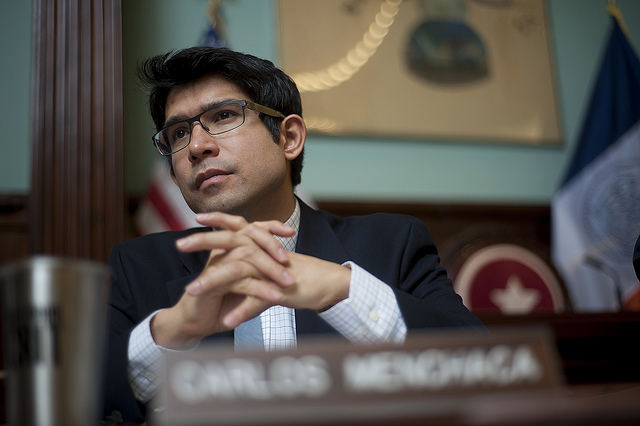Last Friday, Brooklyn Council Member Carlos Menchaca introduced legislation that would allow cyclists to cross with leading pedestrian intervals (LPIs) that give people on foot a head-start on turning motorists at intersections.

LPIs have been implemented at more than 100 intersections in Manhattan, Queens, and the Bronx. Menchaca’s legislation would not require the city to install separate signals for cyclists, but would give cyclists the legal right to cross at the same time as pedestrians. It would cost nothing.
Menchaca said his proposal, Intro. 1072, would legalize a common practice among cyclists that prevents conflicts with drivers. “What I like about this is I think that people already have the instinct to want do it, and I think that instinct is about safety,” he told Streetsblog.
The proposal is in the same vein as legislation proposed by Council Member Antonio Reynoso last year to allow cyclists to treat red lights as stop signs and stops as yield signs. Menchaca said his bill builds on the conversation Reynoso began. “I think Council Member Reynoso really started the conversation in probably one of the more grand ways anyone could do it,” Menchaca said. “What I’m doing is taking a piece out of that vision and bringing it into here and now at a low cost and allowing for us to build that narrative.”
Menchaca said his proposal, co-sponsored by Reynoso and Council Member Brad Lander, is a small step in a greater legislative effort he envisions to shift cultural attitudes toward cycling and Vision Zero. By passing legislation that reflects shifting attitudes about cyclists’ and pedestrians’ use of streets, Menchaca hopes to build a greater understanding of safe streets policy and design in communities across the city.
Menchaca believes such a process can bring more people on board with Vision Zero initiatives. “[Vision Zero] is our model and I think part of that model might mean we do it in increments, in steps that walk people through this," he said. "My vision is about process, my vision is about timing and it’s about doing things that we can do today.”
“Our objective is not to be disruptive. Our objective is to really help culture move along the way," Menchaca said. “We’re talking about everybody. In the culture that I’m envisioning, it’s all these people feeling like they’re being part of this evolution in culture.”
Menchaca said he hopes to hear how other cities have experimented with Idaho stop-inspired laws such as he is proposing. That hearing has yet to be scheduled.





